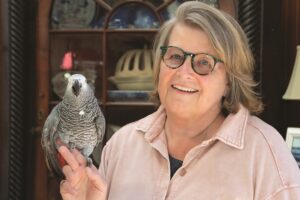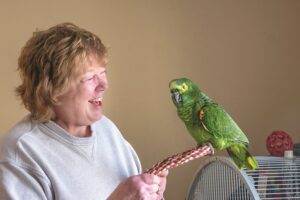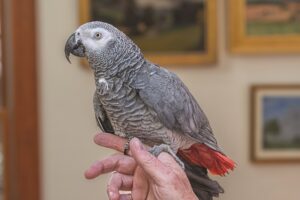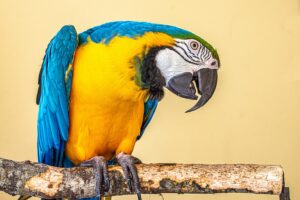EASTHAM — Kerry Reid is conflicted about the fact that she keeps a parrot at her house. “I don’t encourage people to do it,” she says. “It’s a cool thing, but it’s not a cool thing. They can be funny and loving but can also be loud and annoying.”
Cindy Nicholson, who is the town clerk in Eastham, is also a parrot owner and agrees with Reid’s assessment. Living with these birds is a big commitment, she says: “It’s imperative people know what they’re getting into.”

Besides the fact that “they’re extremely loud,” Nicholson says, parrots need to chew to file their beaks. “My windowsills and door frames are destroyed,” she says.
Reid and Nicholson both came to own parrots through adoption. “It’s not uncommon that they outlive their owners,” says Reid, who is a wildlife rehabilitator at Wild Care. The species she has, a Congo African grey, has an average lifespan of 30 years but can live up to 50 years. A macaw, the kind of parrot Nicholson owns, often lives 65 or 70 years.

Reid inherited Everett, her parrot, after her neighbor, the bird’s original owner, died. It was five years ago, right before Everett turned 14. At the time she had another African grey, Edison. “They would finish each other’s sentences, but they couldn’t be out of their cages at the same time,” says Reid. “They are wild animals. They just wanted to kill each other.”
Everett has picked up a few cues from the human world. When Reid’s father was living with them, he would often tell the dog to get out of the way as he navigated around the house in his wheelchair. When a friend of Reid’s tried approaching Everett, his response to her advances was “Get out of the way.”

Parrots, which are monogamous in the wild, will choose one person in a human family to bond with. “He’s super friendly and lovey,” says Reid. But he’s a jealous pet. “He makes the smoke alarm noise to get my attention. He knows how to manipulate me,” she adds. He’s also not fond of visitors. “If someone comes over, he wants to be right next to me and will escalate his noise to equal whoever is speaking,” says Reid.
Unlike Everett, Big El, one of Nicholson’s two parrots, enjoys hanging out with people. “He loves to be with us when we’re entertaining on the back deck,” says Nicholson. He also likes going out for rides to the beach when the weather is nice. Nicholson adopted Big El from a firefighter in Rhode Island whose kids had left for college and outgrown their interest in the bird. The blue-and-gold macaw is now close to 30. She adopted her other bird, Little El, a blue-fronted Amazon, from the Brewster Animal Rescue League. Strangely, both birds had already been named Elwood.

“They are so intelligent,” says Nicholson. At the same time, she says, “They are like three-year-olds that never grow up. They say, ‘Hello.’ They say, ‘Bye, bye’ when I go to work.” When Nicholson comes home she cleans their cages (a twice-a-day chore) and makes them dinner. “They love spaghetti,” she says.
The intense demands of caring for her parrots means that Nicholson rarely gets away. Recently her husband bought a large camper so that they can travel with their birds and dogs. “They travel great,” says Nicholson. “But you don’t want to leave them at the campground, so you’re kind of tied there,” she says. “It’s a labor of love.”



